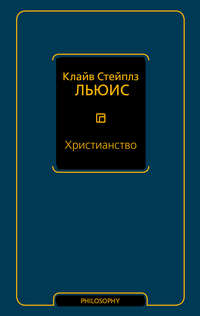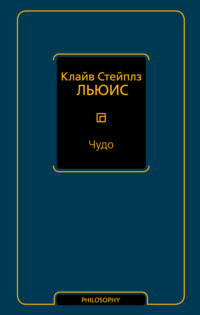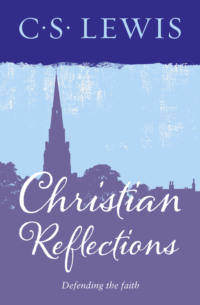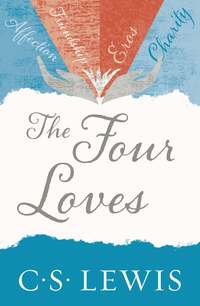
Полная версия
Surprised by Joy
Friends of our own age - boy and girl friends - we had none. In part this is a natural result of boarding school; children grow up strangers to their next-door neighbours. But much more it was the result of our own obstinate choice. One boy who lived near us attempted every now and then to get to know us. We avoided him by every means in our power. Our lives were already full, and the holidays too short for all the reading, writing, playing, cycling, and talking that we wanted to get through. We resented the appearance of any third party as an infuriating interruption. We resented even more bitterly all attempts (excepting the great and successful attempt made by Mountbracken) to show us hospitality. At the period that I am now speaking of this had not yet become a serious nuisance, but as it became gradually and steadily more serious throughout our schooldays I may be allowed to say a word about it here and to get the subject out of our way. It was the custom of the neighbourhood to give parties which were really dances for adults but to which, none the less, mere schoolboys and schoolgirls were asked. One sees the advantages of this arrangement from the hostess’s point of view; and when the junior guests know each other well and are free from self-consciousness perhaps they enjoy themselves. To me these dances were a torment - of which ordinary shyness made only a part. It was the false position (which I was well able to realise) that tormented me; to know that one was regarded as a child and yet be forced to take part in an essentially grown-up function, to feel that all the adults present were being half-mockingly kind and pretending to treat you as what you were not. Add to this the discomfort of one’s Eton suit and stiff shirt, the aching feet and burning head, and the mere weariness of being kept up so many hours after one’s usual bedtime. Even adults, I fancy, would not find an evening party very endurable without the attraction of sex and the attraction of alcohol; and how a small boy who can neither flirt nor drink should be expected to enjoy prancing about on a polished floor till the small hours of the morning, is beyond my conception. I had of course no notion of the social nexus. I never realised that certain people were in civility obliged to ask me because they knew my father or had known my mother. To me it was all inexplicable, unprovoked persecution; and when, as often happened, such engagements fell in the last week of the holidays and wrested from us a huge cantle of hours in which every minute was worth gold, I positively felt that I could have torn my hostess limb from limb. Why should she thus pester me? I had never done her any harm, never asked her to a party.
My discomforts were aggravated by the totally unnatural behaviour which I thought it my duty to adopt at a dance; and that had come about in a sufficiently amusing way. Reading much and mixing little with children of my own age, I had, before I went to school, developed a vocabulary which must (I now see) have sounded very funny from the lips of a chubby urchin in an Eton jacket. When I brought out my ‘long words’ adults not unnaturally thought I was showing off. In this they were quite mistaken. I used the only words I knew. The position was indeed the exact reverse of what they supposed; my pride would have been gratified by using such schoolboy slang as I possessed, not at all by using the bookish language which (inevitably in my circumstances) came naturally to my tongue. And there were not lacking adults who would egg me on with feigned interest and feigned seriousness - on and on till the moment at which I suddenly knew I was being laughed at. Then, of course, my mortification was intense; and after one or two such experiences I made it a rigid rule that at ‘social functions’ (as I secretly called them) I must never on any account speak of any subject in which I felt the slightest interest nor in any words that naturally occurred to me. And I kept my rule only too well; a giggling and gurgling imitation of the vapidest grown-up chatter, a deliberate concealment of all that I really thought and felt under a sort of feeble jocularity and enthusiasm, was henceforth my party manner, assumed as consciously as an actor assumes his rôle, sustained with unspeakable weariness, and dropped with a groan of relief the moment my brother and I at last tumbled into our cab and the drive home (the only pleasure of the evening) began. It took me years to make the discovery that any real human intercourse could take place at a mixed assembly of people in their good clothes.
I am here struck by the curious mixture of justice and injustice in our lives. We are blamed for our real faults but usually not on the right occasions. I was, no doubt, and was blamed for being a conceited boy; but the blame was usually attached to something in which no conceit was present. Adults often accuse a child of vanity without pausing to discover on what points children in general, or that child in particular, are likely to be vain. Thus it was for years a complete mystery to me that my father should stigmatise as ‘affectation’ my complaints about the itching and tickling of new underclothes. I see it all now; he had in mind a social legend associating delicacy of skin with refinement and supposed that I was claiming to be unusually refined. In reality I was in simple ignorance of that social legend, and if vanity had come into the matter would have been much prouder of having skin like a sailor. I was being accused of an offence which I lacked resources to commit. I was on another occasion called ‘affected’ for asking what ‘stirabout’ was. It is, in fact, a ‘low’ Irish word for porridge. To certain adults it seems obvious that he who claims not to know the Low must be pretending to be High. Yet the real reason why I asked was that I had never happened to hear the word; had I done so I should have piqued myself on using it.
Oldie’s school, you will remember, sank unlamented in summer 1910; new arrangements had to be made for my education. My father now hit upon a plan which filled me with delight. About a mile from the New House rose the large red-brick walls and towers of Campbell College, which had been founded for the express purpose of giving Ulster boys all the advantages of a public school education without the trouble of crossing the Irish Sea. My clever cousin, Uncle Joe’s boy, was already there and doing well. It was decided that I should go as a boarder, but I could get an exeat to come home every Sunday. I was enchanted. I did not believe that anything Irish, even a school, could be bad; certainly not so bad as all I yet knew of England. To ‘Campbell’ I accordingly went.
I was at this school for so short a time that I shall attempt no criticism of it. It was very unlike any English public school that I have ever heard of. It had indeed prefects, but the prefects were of no importance. It was nominally divided into ‘houses’ on the English pattern, but they were mere legal fictions; except for purposes of games (which were not compulsory) no one took any notice of them. The population was socially much more ‘mixed’ than at most English schools; I rubbed shoulders there with farmers’ sons. The boy I most nearly made a friend of was the son of a tradesman who had recently been going the rounds with his father’s van because the driver was illiterate and could not keep ‘the books’. I much envied him this pleasant occupation, and he, poor fellow, looked back on it as a golden age. ‘This time last month, Lewis,’ he used to say, ‘I wouldn’t have been going in to Preparation. I’d have been coming home from my rounds and a wee tea-cloth laid for me at one end of the table and sausages to my tea.’
I am always glad, as a historian, to have known Campbell, for I think it was very much what the great English schools had been before Arnold. There were real fights at Campbell, with seconds, and (I think) betting, and a hundred or more roaring spectators. There was bullying, too, though no serious share of it came my way, and there was no trace of the rigid hierarchy which governs a modern English school; every boy held just the place which his fists and mother-wit could win for him. From my point of view the great drawback was that one had, so to speak, no home. Only a few very senior boys had studies. The rest of us, except when seated at table for meals or in a huge ‘preparation room’ for evening ‘Prep’, belonged nowhere. In out-of-school hours one spent one’s time either evading or conforming to all those inexplicable movements which a crowd exhibits as it thins here and thickens there, now slackens its pace and now sets like a tide in one particular direction, now seems about to disperse and then clots again. The bare brick passages echoed to a continual tramp of feet, punctuated with catcalls, scrimmages, gusty laughter. One was always ‘moving on’ or ‘hanging about’ - in lavatories, in store rooms, in the great hall. It was very like living permanently in a large railway station.
The bullying had this negative merit that it was honest bullying; not bullying conscience-salved and authorised in the maison tolérée of the prefectorial system. It was done mainly by gangs; parties of eight or ten boys each who scoured those interminable corridors for prey. Their sorties, though like a whirlwind, were not perceived by the victim till too late; the general, endless confusion and clamour, I suppose, masked them. Sometimes capture involved serious consequences; two boys whom I knew were carried off and flogged in some backwater - flogged in the most disinterested fashion, for their captors had no personal acquaintance with them; art for art’s sake. But on the only occasion when I was caught myself my fate was much milder and perhaps odd enough to be worth recording. When I had come to myself after being dragged at headlong speed through a labyrinth of passages which took me beyond all usual landmarks, I found that I was one of several prisoners in a low, bare room, half-lit (I think) by a single gas-jet. After a pause to recover their breath two of the brigands led out the first captive. I now noticed that a horizontal row of pipes ran along the opposite wall, about three feet from the floor. I was alarmed but not surprised when the prisoner was forced into a bending position with his head under the lowest pipe, in the very posture for execution. But I was very much surprised a moment later. You will remember that the room was half dark. The two gangsters gave their victim a shove; and instantly no victim was there. He vanished; without trace, without sound. It appeared to be sheer black magic. Another victim was led out; again the posture for a flogging was assumed; again, instead of flogging, - dissolution, atomisation, annihilation. At last my own turn came. I too received the shove from behind, and found myself falling through a hole or hatch in the wall into what turned out to be a coal-cellar. Another small boy came hurtling in after me, the door was slammed and bolted behind us, and our captors with a joyous whoop rushed away for more booty. They were, no doubt, playing against a rival gang with whom they would presently compare ‘bags’. We were let out again presently, very dirty and rather cramped, but otherwise none the worse.
Much the most important thing that happened to me at Campbell was that I there read Sohrab and Rustum in form under an excellent master whom we called Octie. I loved the poem at first sight and have loved it ever since. As the wet fog, in the first line, rose out of the Oxus stream, so out of the whole poem there rose and wrapped me round an exquisite, silvery coolness, a delightful quality of distance and calm, a grave melancholy. I hardly appreciated then, as I have since learned to do, the central tragedy; what enchanted me was the artist in Pekin with his ivory forehead and pale hands, the cypress in the queen’s garden, the backward glance at Rustum’s youth, the pedlars from Khabul, the hushed Chorasmian waste. Arnold gave me at once (and the best of Arnold gives me still) a sense, not indeed of passionless vision, but of a passionate, silent gazing at things a long way off. And here observe how literature actually works. Parrot critics say that Sohrab is a poem for classicists, to be enjoyed only by those who recognise the Homeric echoes. But I, in Octie’s form-room (and on Octie be peace) knew nothing of Homer. For me the relation between Arnold and Homer worked the other way; when I came, years later, to read the Iliad I liked it partly because it was for me reminiscent of Sohrab. Plainly, it does not matter at what point you first break into the system of European poetry. Only keep your ears open and your mouth shut and everything will lead you to everything else in the end - ogni parte ad ogni parte splende.
About half-way through my first and only term at Campbell I fell ill and was taken home. My father, for reasons I do not quite know, had become dissatisfied with the school. He had also been attracted by accounts of a preparatory school in the town of Wyvern, though quite unconnected with Wyvern College; especially by the convenience that if I went there my brother and I could still do the journey together. Accordingly I had a blessed six weeks at home, with the Christmas holidays to look forward to at the end and, after that, a new adventure. In a surviving letter my father writes to my brother that I think myself lucky but he ‘fears I shall be very lonely before the end of the week’. It is strange that having known me all my life he should have known me so little. During these weeks I slept in his room and was thus freed from solitude during most of those dark hours in which alone solitude was dreadful to me. My brother being absent, he and I could not lead one another into mischief; there was therefore no friction between my father and myself. I remember no other time in my life of such untroubled affection; we were famously snug together. And in the days when he was out, I entered with complete satisfaction into a deeper solitude than I had ever known. The empty house, the empty, silent rooms, were like a refreshing bath after the crowded noise of Campbell. I could read, write, and draw to my heart’s content. Curiously enough it is at this time, not in earlier childhood, that I chiefly remember delighting in fairy tales. I fell deeply under the spell of Dwarfs - the old bright-hooded, snowy-bearded dwarfs we had in those days before Arthur Rackham sublimed, or Walt Disney vulgarised, the earthmen. I visualised them so intensely that I came to the very frontiers of hallucination; once, walking in the garden, I was for a second not quite sure that a little man had not run past me into the shrubbery. I was faintly alarmed, but it was not like my night-fears. A fear that guarded the road to Faerie was one I could face. No one is a coward at all points.
4 I BROADEN MY MIND
I struck the board, and cry’d, ‘No more; I will abroad’.
What? shall I ever sigh and pine?
My lines and life are free: free as the rode,
Loose as the winde, as large as store.
HERBERT
In January 1911, just turned thirteen, I set out with my brother to Wyvern, he for the College and I for a preparatory school which we will call Chartres. Thus began what may be called the classic period of our schooldays, the thing we both think of first when boyhood is mentioned. The joint journeys back to school with a reluctant parting at Wyvern station, the hilarious reunion at the same station for the joint journey home, were now the great structural pillars of each year. Growing maturity is marked by the increasing liberties we take with our travelling. At first, on being landed early in the morning at Liverpool, we took the next train south; soon we learned that it was pleasanter to spend the whole morning in the lounge of the Lime Street Hotel with our magazines and cigarettes and to proceed to Wyvern by an afternoon train which brought us there at the latest permitted moment. Soon too we gave up the magazines; we made the discovery (some people never make it) that real books can be taken on a journey and that hours of golden reading can so be added to its other delights. (It is important to acquire early in life the power of reading sense wherever you happen to be. I first read Tamburlaine while travelling from Larne to Belfast in a thunderstorm, and first read Browning’s Paracelsus by a candle which went out and had to be relit whenever a big battery fired in a pit below me, which I think it did every four minutes all that night.) The homeward journey was even more festal. It had an invariable routine: first the supper at a restaurant - it was merely poached eggs and tea but to us the tables of the gods - then the visit to the old Empire (there were still music halls in those days) - and after that the journey to the Landing Stage, the sight of great and famous ships, the departure, and once more the blessed salt on our lips.
Конец ознакомительного фрагмента.
Текст предоставлен ООО «ЛитРес».
Прочитайте эту книгу целиком, купив полную легальную версию на ЛитРес.
Безопасно оплатить книгу можно банковской картой Visa, MasterCard, Maestro, со счета мобильного телефона, с платежного терминала, в салоне МТС или Связной, через PayPal, WebMoney, Яндекс.Деньги, QIWI Кошелек, бонусными картами или другим удобным Вам способом.








